I interned in Congressman Gary Condit’s Capitol Hill office the summer after I graduated from high school. Soon after, he would be embroiled in this century’s first notorious political scandal: the murder of young staffer Chandra Levy. A few years ago, the uncertainties, confusion, and disillusionment of that experience spilled out onto the page. Those early days in DC were powerful inspirations for the people and places of my debut novel The Perfect Candidate. Just as influential as my internship are the political thrillers I’ve read over the years.

Michael Dobbs, House of Cards
Before Netflix introduced the world to a despotic DC in the American series and the BBC released its take on British bureaucrats behaving badly—Michael Dobbs’ novel started it all. I tracked down a copy after I’d binged the US adaptation, and I found the UK-based inspiration to be even colder and more disturbing. Prime Minister wannabe Francis Urquhardt stalks the halls of Parliament with unnerving ease and disturbing charm. Barely evading the chase of his past sins, the deliciously devious chief whip’s actions would make even Machiavelli phone the Ethics Committee.
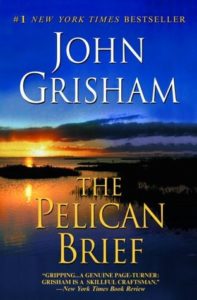
John Grisham, The Pelican Brief
Law school student Darby Shaw is the rare female Grisham protagonist, and this time, the author takes his main character beyond his traditional Southern courtroom setting—all the way to the White House. With two Supreme Court justice assassinations and a car bomb in the first few chapters, Shaw’s riveting journey of paranoia is a must-read for those who haven’t met her yet; and worth revisiting for fans who devoured the book long ago. Grisham’s gift for making even research scenes breathless made my own lifelong love of thrillers took root.
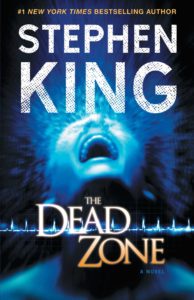
Stephen King, The Dead Zone
Here’s hoping that the recent rediscovery (and remaking) of the definitive horror author’s early work will extend to this brooding, brutal story (unique among the King canon due to its unforgettable rendezvous with politics). The title refers to a damaged part of protagonist Johnny Smith’s brain, which not only caused a five-year coma but also yielded a precognitive ability. As with all King tales, the book is responsible for many lingering, nightmarish visions. But one scene is most vivid for me: when Smith foresees a US president’s nuclear warmongering, he resolves to kill the candidate before he’s even elected. This sets the stage for the most suspenseful political campaign stop in literary history. The assassination is chilling and perverse and not at all as planned, but I think King’s intentions for readers have been perfectly fulfilled. I’ll never look at a political convention speech the same way again.
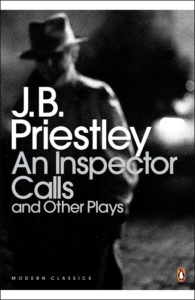
J. B. Priestley, An Inspector Calls
I saw this play at a young age—before I could fully understand the class system metaphors, political undertones, and dread of the Birling family secrets. But the jaw-dropping final minutes are astonishing to any age. When the local politician Patriarch throws an engagement party for his privileged daughter, news of a poor woman’s death dampens the mood, to say the least. Track down this script, meet the enigmatic Inspector Goole, and prepare to read it a second time after you realize what he was really up to.
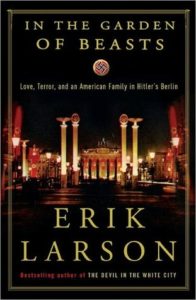
Erik Larson, In the Garden of Beasts
My favorite of Larson’s stellar historical non-fiction books explores the electrical charges forming in the Berlin air before World War II ravaged the city. Larson’s genius lies in the POV for much of the story: the libidinous and naïve daughter of the ill-fated US Ambassador. We watch her weak-kneed submission to the sleek and sinister political forces of the time; and ask ourselves how we would respond to the same seduction.
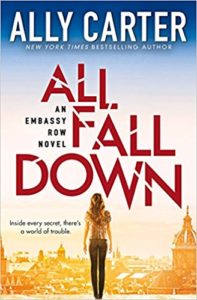
Ally Carter, All Fall Down
“I guess diplomacy doesn’t always extend to teenage girls with my sort of reputation.” Thus kicks off the first book of Carter’s popular YA series—an unputdownable, layered mystery set against the backdrop of an American embassy in a Mediterranean country. The political DNA of the novel first caught my eye, but it’s protagonist Grace Blakeley’s poignant search for the truth about her mother’s death that kept me turning the page. An uncommon YA entry into the genre that got my own creative wheels turning.
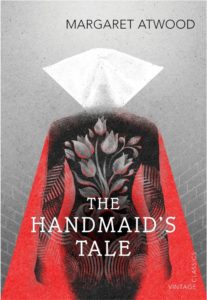
Margaret Atwood, The Handmaid’s Tale
The Republic of Gilead may be fictional, but its tyranny and dystopic detail are frighteningly plausible. The shockingly rapid re-embrace of Puritanical barbarity in a near-future (and renamed) United States is told in a matter of fact, logical manner. A comparison of the novel and season 1 of the sensational Hulu adaptation reveals general faithfulness to the original’s plot; though the book’s racial separation (and ominous “resettlement” of non-whites) takes the military dictatorships’s actions to greater depths of evil. It would all be hopeless, if not for our heroine Offred’s undaunted, pragmatic, and occasionally savage rebellion. Her journey and hope keep us reading despite the punishing and sinister reality she faces. A thrilling, thought-provoking read, Atwood’s words condemn fundamentalism in any form and call for even the most tormented and marginalized to never stand down.
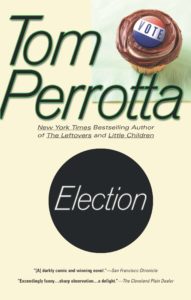
Tom Perrotta, Election
While not technically classified as a political thriller, Perrotta’s sophomore novel is nonetheless shocking, nasty, and thrilling. It’s Primary Colors meets Mean Girls. The hotly contested campaign for student body president of a New Jersey high school is the setting for the author’s examination of teenage ambition and greed. We have Alexander Payne’s celebrated film adaptation to thank for Reese Witherspoon’s career-defining Tracy Flick, but the book settles into the lives of many more students at Winwood High School. And it’s in those details that we truly appreciate the idiosyncrasies, angst, and words of these kids. I didn’t know anyone who talked like them when I was growing up, but I wanted to. And a few of these cutting commentators found their way into my own writing.
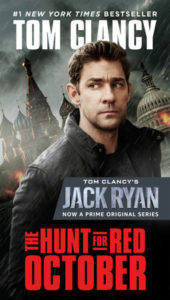
Tom Clancy, The Hunt for Red October
This early entry in the Jack Ryan series proves why Tom Clancy is the grandfather of the modern American political page-turner (and arguably the inventor of the “techno-thriller”). The Cold War tale takes place almost entirely inside of American and Soviet submarines, and the exceptional level of detail is all the more remarkable given that this was Clancy’s first book (he was an insurance broker when he wrote it). Bolstered by an endorsement from President Reagan, the novel launched Clancy’s career. But even more impactful was his lasting legacy on the page and screen: when the political jargon of a spy or CIA operative sends you clamoring for Google, you can thank a certain insurance salesman who elevated the standard of realism in thrillers—all in his spare time.
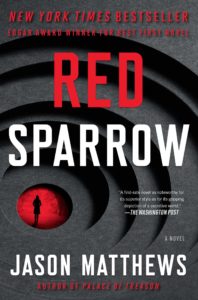
Jason Matthews, Red Sparrow
In contrast to Clancy’s extensive research, author Jason Matthew’s knowledge of covert US-Russian political conflict comes from personal experience. A retired officer of the CIA’s Operations Directorate, he channels the deceivingly delicate ballerina-turned-Russian spy Dominika Egorova. Matthews’ is a contemporary, realistic Moscow (the presence of Vladimir Putin adds to the urgency). But his exploration of the “Sparrow School” feels enthrallingly old-school. Dominika’s training as a seductress and her prodigious mastery of the job are as gratifying to read as any superhero origin story. But her haunted emotional core and the sophisticated plot twists set this spy tale apart. Bonus: it’s just the first of a trilogy.
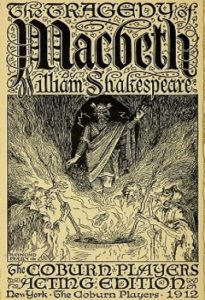
William Shakespeare, Macbeth
The great-great-granddaddy of all political thrillers, this is also my favorite of the Bard’s meditations on power and tragedy. The story is simple: a political climber takes down the leader in order to inherit the throne; and once he’s assumed the crown, the real troubles begin. But this story gives us so much more. We’ve got: eerie Scottish moors, a serial killer king, righteous mutiny, ghosts, and perhaps most indelibly, a doozy of a First Lady whose vampiric appetite for status inspired countless literary imitators (and more than a few Real Housewives). And don’t forget the witches! When these three cryptic ladies enchant Macbeth with their heady visions of monarchy in the first act, we know the guy is screwed—but, like any good political thriller, we also know it’s going to be a lot of fun reading it all go down.

















